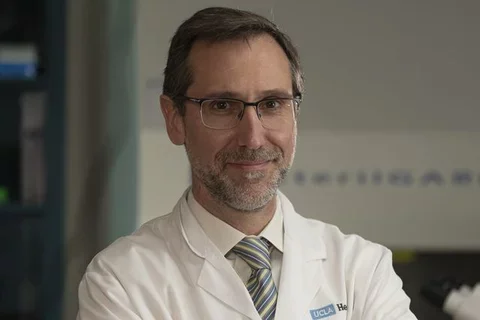UCLA physician-scientist elected to National Academy of Medicine

Dr. Antoni Ribas, a world-renowned physician–scientist and professor of medicine at the David Geffen School of Medicine at UCLA, has been named to the National Academy of Medicine, one of the highest honors in the fields of health and medicine.
New members are elected by their peers, and selection to the academy honors individuals who have demonstrated outstanding professional achievement and commitment to service and have made major contributions to the advancement of the medical sciences, health care and public health.
The academy recognized Ribas for defining the mechanistic basis of how patients respond to or develop resistance to immunotherapy drugs known as checkpoint inhibitors and for leading multicenter clinical trials that have provided transformative treatments for patients with advanced melanoma, which was once thought untreatable.
A pioneer in cancer immunology, Ribas has devoted his career to developing and refining new therapies for malignant melanoma. His research focuses on how the immune system can be used to fight cancer in order to develop more effective and less toxic therapies for people with melanoma.
“It is a privilege to be recognized by the National Academy of Medicine,” said Ribas, who directs the tumor immunology program at the UCLA Jonsson Comprehensive Cancer Center. “It speaks to the impact immunotherapy has played in cancer research. When I started treating cases of melanoma that had metastasized to other organs, maybe 1 in 20 responded to treatment. Nobody in their right mind wanted to be a specialist in this field. It was the worst of the worst cancers.”
But that changed in 2014, when Ribas helped develop and demonstrate the effectiveness of the immunotherapy drug pembrolizumab, marketed under the brand name Keytruda, to treat advanced melanoma. Pembrolizumab was the first of the class of PD-1–blocking antibodies to be approved by the U.S. Food and Drug Administration for the treatment of cancer and has been a significant advancement in the fight against the disease. Advanced melanoma went from being labeled as a fatal disease to one that is often cured.
“In the two decades Dr. Ribas has been with UCLA, he has played a pivotal role in advancing treatments for people with hard-to-treat cancers,” said Dr. Kelsey Martin, dean of the Geffen School of Medicine. “I am thrilled to see him receive this well-deserved recognition, which is another testament to his remarkable commitment to transforming the way people with cancer are treated.”
Ribas, who has been involved in the FDA approval of four additional drugs for patients with melanoma, continues to investigate how tumors become resistant to these immunotherapies in the hopes of overcoming such impediments and expanding the number of people who can benefit from treatment. His research has also helped lead to new combination therapies that are being successfully advanced in the clinic.
“Dr. Ribas has been a pioneer, both in the laboratory and the clinic, creating innovative, individualized treatments for his patients,” said Dr. Michael Teitell, director of the Jonsson Cancer Center. “His track record of quickly turning breakthroughs in the laboratory into new therapies is impeccable.”
Ribas joins 40 other UCLA faculty from the schools of medicine, public health and dentistry and the UCLA College who have been elected to the National Academy of Medicine. The academy, known from 1970 to 2015 as the Institute of Medicine, provides independent analysis, informs public policy decisions, encourages education and research, and increases public understanding of medical and health issues.
Ribas, who has been the recipient of numerous national and international awards and grants, is a member of the Eli and Edythe Broad Center of Regenerative Medicine and Stem Cell Research at UCLA, director of the Parker Institute for Cancer Immunotherapy Center at UCLA and currently serves as president of the American Association for Cancer Research.
Original Article: "UCLA physician-scientist elected to National Academy of Medicine"



